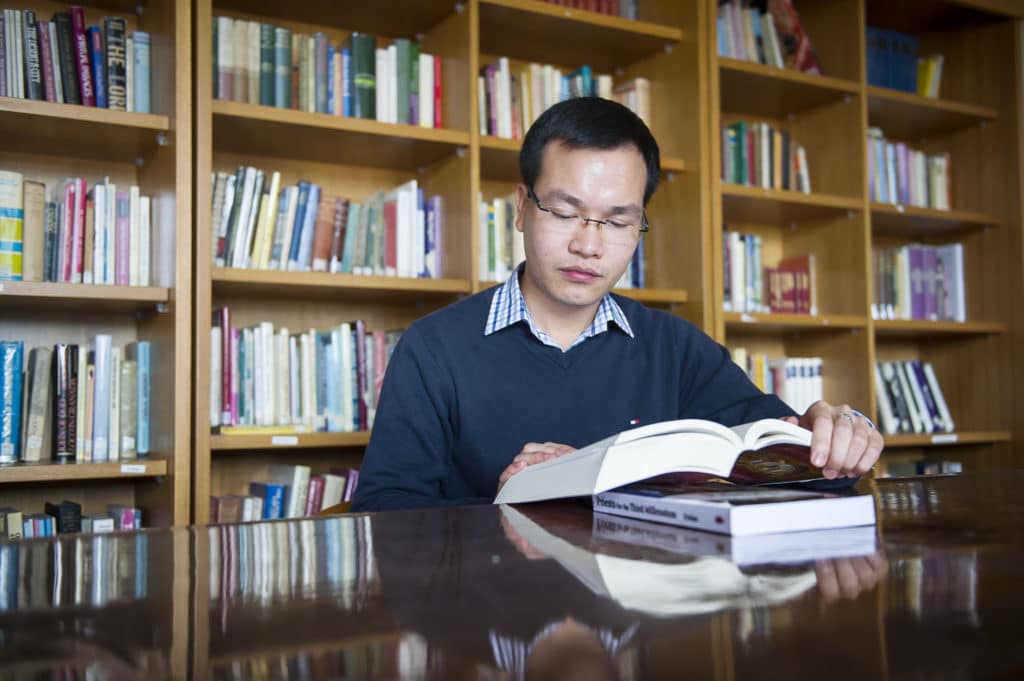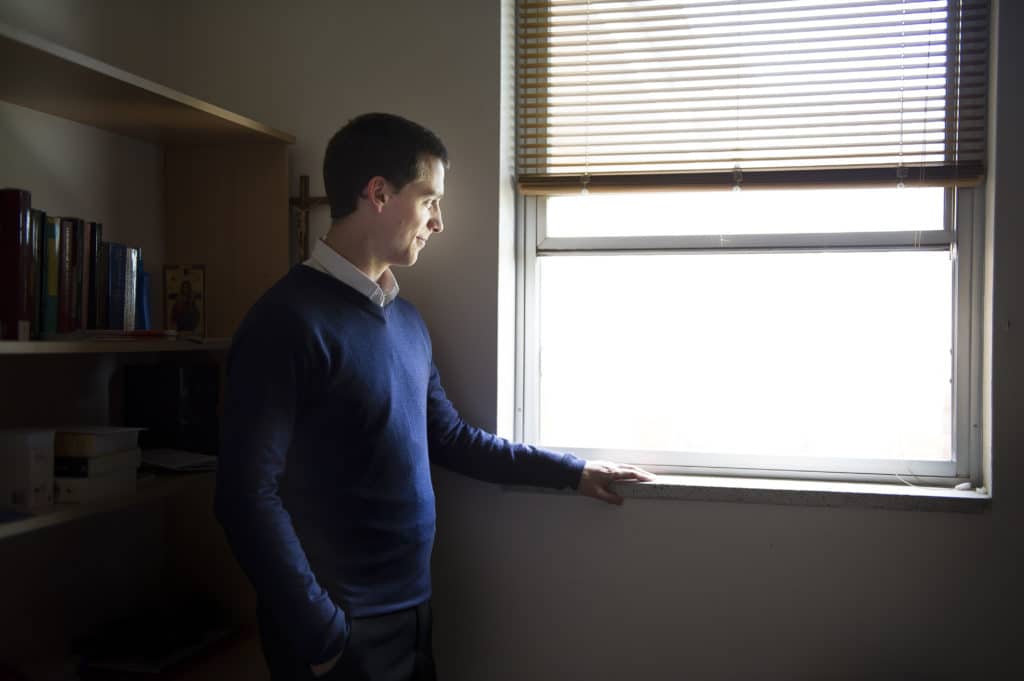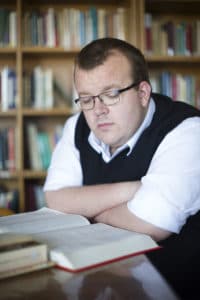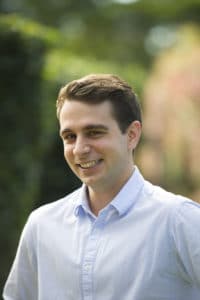There’s a crop of fresh faces at the Seminary of the Good Shepherd in Homebush. The seminary is now home to five new students discerning their vocation to the priesthood for the Sydney archdiocese and the dioceses of Wollongong and Bathurst. All are in their 20s. All have completed higher education. All have a deep love for the Church. But they’re not your typical seminarians. As each had to realise, there’s no such thing …
Nam Le
Age: 25; Diocese of Bathurst
The friendly chaos of Hanoi, population 6.5 million, could not have been further from the country village of Dunedoo, whose population tops 850 people on just two weekends a year, where Vietnamese-born seminarian Nam Le found himself two weeks after arriving in Australia last year.
“It’s very, very different” is Nam’s almost unnecessary assessment.
But the engineering construction graduate was “very happy” in the rural village, home of the Dunedoo Show and rodeo, and annual bush poetry festival.
“The main thing was the culture, and how is the Catholic Church in the countryside,” he says.
“In my parish in Vietnam, one small parish has 1400 Catholic people. In Dunedoo they have just 200 or 300 Catholics.”
Nam had been studying construction engineering at university in Hanoi, where he led more than 300 young people in the Catholic students association on retreat, when he encountered the Bishop of Bathurst, Bishop Michael McKenna, on an annual recruitment visit.
(Asked once why, with a background in construction engineering, he wanted to become a priest, Nam replied: ‘So I can build a church.’)

While the pair communicated through interpreters, Bishop McKenna was impressed with what he saw.
The bishop would later sponsor Nam to move to Australia and enter the seminary for the Bathurst diocese.
“When I was thinking about my vocation, the main thing is that I wanted to be like Christ, to shape my life in the life of Christ,” Nam says.
“From that I can serve the people.
“In Vietnam the people have a lot of respect for priests and nuns. The people serve the priests and nuns. But we also serve them.”
Nam recognised that seminary numbers in Vietnam are sufficient to serve the needs of the Church there.
“So I thought about serving the people outside of Vietnam. I saw there are not many people who wanted to become priests in Europe, America or Australia.
“I wanted to come here to serve the people here.”
It is a vocation encouraged by his family.
“In Vietnamese culture, if one member of a family wants to become a priest, they are very happy,” Nam says. “My family has been very supportive.”
While at university in Hanoi, he could return to his family home in the diocese of Vinh, 300km away, only once or twice a year.
Now, Nam is more than 7000km from home.
While the distance isn’t easy, he and his family honour “God’s will” in his life, he says.
And he is learning to call Australia home.
“God helps me with my vocation day by day. Accommodation, food, weather, culture, nothing is difficult for me.”
As for dating, “my vocation came early”, he says.
While there were girls he was interested in, “the love, I give to God”.
“It’s not a sacrifice”, he says of giving up marriage and children for the priesthood.
Nam settled in to first year quickly, having spent time at Good Shepherd in 2014 learning English.
“I feel very peaceful here.”
While he has been “learning Australian culture”, his priority is “to think about my vocation, to discern my vocation”.
“I was a bit nervous because my English wasn’t good enough, but now I am very peaceful, very happy, and enjoying first year.
“They call it the foundation or spiritual year. It’s different to the other years, and I’ve found it very helpful. At first when I came here I felt it was very different, but now I can see what I need to do when I become a priest, what I have been called to do.
“People don’t go to church here as much as in Vietnamese culture.”
While Sydney, with its melting pot of cultures and large Vietnamese population, was “not very different to Vietnam”, Nam says he was not prepared for the Bathurst diocese.
“I hadn’t heard of Bathurst before, and couldn’t imagine what it would be like with the Australian culture,” he says.
Dunnedoo, with its limited grocery options, was “the first challenge”.
“Even in Mudgee you can buy something similar, but in Dunnedoo you can’t, there is no Asian food there.
“When I went back to Cabramatta I bought some Vietnamese food and took it to Dunnedoo. I cooked it for everyone and after Mass I invited people to eat, and they enjoyed it.
“In the presbytery I usually cooked Vietnamese food, and the parish priest would invite someone to come and enjoy lunch or dinner with me.”
Despite the cultural differences, Nam has nothing but praise for the people of Bathurst diocese.
“People have been very kind, very friendly,” he says.
“Bathurst is where God is calling me to be, and I call the diocese my second home.”
Despite the long distances, small parishes, and shrinking congregations, the young seminarian who loves soccer, reading and writing is eager to return to this second home and get to work.
“I felt God calling me there, to serve the people,” he says.
“That is the challenge, but that is the thing God called me to be, to deal with that challenge.”
Benjamin Gandy
Age: 24; Archdiocese of Sydney
For many young people, the first stirrings of a religious vocation are inconvenient in the face of plans for university, travel, marriage.
A gifted musician, Benjamin Gandy made the decision to enter the seminary as he prepared to embark on a different path: a four-year music education degree at the Sydney Conservatorium of Music.
“I started my first day at the conservatorium and I remember thinking, ‘I know what I want to do after this degree’ and that was enter the seminary.”
Though thoughts of entering the seminary had “always been there”, it was only when he pursued his degree that he realised his call to the priesthood was not going to be silenced.
“Once I was there I realised: ‘This is good, but I’m not quite fulfilled’.”
But Benjamin believes in finishing what you start.
“I think you should finish something once you’re in it, especially a musically-stimulating place like the Con.”
On graduating, he turned down an opportunity to teach music in the UK in favour of entering the seminary. “I didn’t really feel comfortable going into education. I just didn’t think it was for me.”
While Benjamin’s parents and five siblings had seen in him signs of a possible priestly vocation, he was, to the outside world, consumed by his musical education.
“When I announced it at the end of my degree, people were surprised,” he says, “but I just followed where God called me.”
Though he had been in a serious relationship, “God was asking me, ‘Ben, what do you really want?’
“I feel very clear about what exactly God wants from me. I don’t really see it as a sacrifice; I see it very much as a ‘yes’ to God.”

In addition to music, the young seminarian is a keen bushwalker and cyclist.
“Going for bushwalks, I find God,” he says. “It’s very close to me, as a hobby and as a spiritual exercise.”
Having studied in Sydney, he had settled into the archdiocesan Catholic youth scene and participated in events including 40 Days for Life and Reasons for Hope.
He “got to know Sydney people and Sydney churches and Sydney culture in the Catholic terms” and decided to enter the seminary for the archdiocese.
Benjamin named Wollongong priest Fr John Stork as a spiritual adviser he “could not have done without”.
“He was a regular confessor; I served for him once a week, so we got to know each other on very, very good terms.”
Though some may be turned off the idea of pursuing a priestly vocation while the Church in Australia is under a legal and media microscope, Benjamin disagrees.
“This is one of the best times to enter and start challenge people’s prejudices,” he says.
“This is a good chance to become very educated and very articulate about these issues.
“What happened was terribly, terribly wrong, but it’s important that when prejudice comes in, we defend where we should, where we can.”
For Benjamin, faith and music are inseparable.
“I’m currently doing an assignment in our spirituality course on the relationship between spirituality and music, how God comes to us by music and we are drawn to Him.
“In terms of my overall spiritual life, music has played a very, very big part in that.
“All of my family members play, except Dad, who I think is tone-deaf. There is always one in every family.”
He believes there is room in the priesthood for composing and playing music, and looks to “priests who have come before me in the archdiocese, like Fr John de Luca, and even composers like Vivaldi who was an ordained priest while composing and teaching”.
“One of my favourite composers, a Spanish renaissance composer, was also a priest, so he perfectly wed the two. For me, as a composer, there is definitely room to take music into my priesthood, God willing I’m there.”
Adrian Simmons
Age: 29; Archdiocese of Sydney
At 29 Adrian Simmons is the eldest of the first-year seminarians at Good Shepherd.
As such, he admits to having been set in his ways before entering the structured life of the seminary, which includes set meal times, no mobile phones, and no weekday internet access.
But “among these drastic changes, there is a deep sense of peace”, he says.
“And that’s the best way I can describe it. Because it is difficult; it is challenging. But I have a deep sense of peace.
“It’s about allowing for Jesus to ‘take the wheel’.”
Adrian’s path to this year of discernment is long and indirect, from working a single night as a bouncer to training as a cobbler.
He enjoys camping and playing music, and his own musical tastes range from Paganini to Metallica.
At 17 he was drawn to join the military but, after being turned away until he turned 18, opted to enrol in chemistry and medical science at university.
In the years that followed he explored several jobs, including working in security, loss prevention and risk management,
“It was then that I started thinking: ‘Is this what I really want to be doing’?”
While priesthood had been on his mind since 2007, he continued to date while he discerned his vocation.
It was during this time, he says, that he experienced two “amazing relationships that have allowed me to mature and understand a little bit more clearly what it means to fall in love”.
But “my heart wasn’t in it, and I think they sensed that”.

After “trying to find every reason not to do it”, he realised “my heart will not be settled, will not be at peace” without at least giving the seminary a try.
“This is what has been there with the Church, the intoxicating madness and persistent attraction.”
While the focus on spirituality in first year differs from his science background, “that carries over into the pastoral application of what we learn”, he says.
“It isn’t black and white, one size doesn’t fit all, the universality or the Catholicity of the Church means many different cultures, many different ethnicities.”
Despite the emotion involved, he is pragmatic about outcome.
“This may not be where I am called to be, but I have to look at it,” he says.
Adrian is attracted to hospital ministry, which he sees as a “privileged place of encounter with God, particularly God’s mercy”.
“There, people have a greater ability to be open. It’s also a place where some people can be isolated, and that is a place where the priest needs to be.”
It is for those reasons that he was drawn to diocesan priesthood.
“I particularly like the nature of the parish, hence why I have chosen diocesan priesthood, not a religious life.
“I like the parish environment, this intersection of the domestic churches, where you’ve got unique families and people from different generational and cultural backgrounds coming together to be in the presence of God.”
Adrian grew up in the cradle of a Catholic family, including his parents, grandmother and aunts.
“It was there, in that domestic church, that I saw the first seeds of priesthood.
“I saw them praying, I saw their connection with God; Mass attendance was non-negotiable.
“My grandmother is an example of this silent devotion. I remember her praying the rosary … just seeing her pious actions certainly left an impact on me.”
For the past six years his free time has been devoted to adoration nights, mission work, and Catholic youth events.
In a different life he spent five years working with trained leather workers and cobblers
“I found it very relaxing, after using your mind at uni which could be somewhat monotonous,
“With fixing shoes, making shoes, leatherwork in general, that was more creative and allowed me to relax and use other parts of me.”
Above all, Adrian feels called to serve.
“Do I think I’m going to be a great priest? No, but I’m going to do my level best because I think it’s something that people need,” he says. “We need good priests.”
Men should not be discouraged from their vocations by public perceptions of the Church, he says.
“I think young people can become disheartened because of negative (attention).
“But we’re not here to perpetuate the problem. We’re here to be the solution, and we need more people for the solution.”
James Arblaster
Age: 24; Diocese of Wollongong
James Arblaster is honest about his most distinct memory of his first day at the Seminary of the Good Shepherd in February.
“I remember standing in my room thinking: ‘What the hell am I doing’?”
Five months in, his fears have been allayed, as has the emptiness he had felt since his teen years.
James was still in high school when the idea of priesthood first came to him.
“I remember being on my knees in my bedroom, praying, out of this sense of emptiness,” he recalls.
“You know when you’re so open with yourself because you’re really vulnerable, and you open that vulnerability up to God?
“That was when I first sensed the true desire, potentially, for priesthood.
“It scared me.”
He told himself “it’s not going to happen” and “put a lid on it”, while continuing with the conventional path for his life: finish the HSC, study law degree, travel.
He graduated from Wollongong University in 2014 with a degree in law and international studies, but the emptiness remained.
“I thoroughly enjoyed law, but it just wasn’t satisfying me on the level that I deeply wanted.
“After wrestling with it and the Catholic faith, with everything you argue with, I had to be honest.
His internal monologue was as follows: It’s been five years and I’m about to finish law, I’d still be interested in going in to some government job, I lived in Spain for a year, and if all that isn’t fulfilling then maybe it’s time.
“That’s when I applied.”
James approached Wollongong priest Fr David Catterall, who had been “very supportive of me generally in the parish – I think he saw it coming.
“I can remember sitting in his office telling him, and he was just so happy.”
Fr David advised James to mention it only to those close to him while he continued to discern.
“I wasn’t in a rush to tell people anyway.”
His mum would the first family member he told.
“She was positive but cautious. This has been the common attitude of my family; ‘if this is something you want to do then we’ll support you, of course, but we have reservations’. Which I think is fair enough.”
It would be months before he told his younger brothers.
“For me, it’s been going on for forever, but for them it’s been a kind of rapid transition.
“With decisions like this, people do need their own time to process it, and I respect that.”
His last few days before the start of the seminary year were spent “rushing around, packing, saying goodbye to friends”.
Though he would be just 80km from Wollongong, there was a “dramatic sense of separation”.
On arrival at Homebush he was “so anxious”, he recalls.
“I was so scared.”

Photo: Giovanni Portelli
But, after settling into his new home, adapting to seminary life, and getting to know his fellow students, James says his anxiety has disappeared. “Within a week I was so much calmer. I kind of relaxed into this sense of peace.”
A key process for him has been overcoming pre-conceived ideas about seminarians – “what they did, how often they prayed, what they wore and who they talked to and what their background was”.
“There is still a stereotype that you think of when you think about seminarians or priests.
“The story for me has been the story of breaking down the prejudices that I had about the seminary – even though I was in the seminary!”
For James, those prejudices had been responsible for one nagging thought.
“You know, I can’t remember feast days. I’d never prayed the office.
“There was the fear of not being Catholic enough.”
James couches his vocation in conditional language – potentially, possibly, if – as he continues to discern.
His time in the seminary is “more in the nature of exploratory rather than because it’s the only option or because I don’t feel called to anything else”.
“I certainly haven’t come here with that [marriage and children] ruled out. I’ve come up here because this other vocation has opened up.
“For me, the experience has been if your life is supposed to be lived in your relationship to God then that will be the ultimate good that you can do for other people.
“You can serve very, very well in marriage, and it is beautiful, but this is also a beautiful calling.”
While James’ interests range from playing the piano to hiking, his “ultimate interest” is being around other people.
“Priesthood is definitely a social vocation.” And it’s not one he is swayed from because of “bad press about priesthood”.
“If you feel called to marriage, out of the experience of that love, it’s not because you’ve made a decision based on divorce statistics.
“You always have to expect that people are going to bring it up and talk about – ‘how can you possibly do this? They’re all child molesters’.
“It hasn’t affected how I feel about the priesthood; it has affected how I talk about it
“That has happened, and it’s not something you can shy away from, but at the end of the day if you feel called to it then that could be something you find your greatest joy in.
“Those other issues, as important as they are, are still peripheral to your own experience of that.”
With its focus on the catechism, the first year in the Sydney seminary is geared towards developing “an awareness of what being a Catholic is and what the Catholic Church teaches, so that we’re shaped by the actual authentic documents of the Church”.
James says he has “felt confirmed” in his ideas, but is also “happy to discern out” if he decides priesthood is not for him.
“It’s not just a place of professional training,” he says.
“Ultimately I think the seminary is, first and foremost, a place of discernment.”
